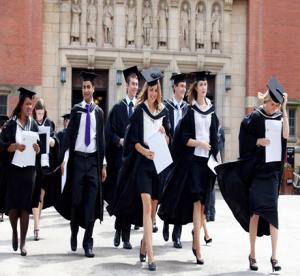Men are becoming 'disadvantaged group' in UK universities
英国大专院校招生服务机构负责人表示,申请大学学位课程的男生比例下降或让男生在教育方面处于“弱势”地位,从而影响其社会生存状况,因为大学毕业生的收入通常都高于未接受高等教育的普通员工。该机构统计数据显示,今年英国国内申请大学的学生中,女生比男生多出8万多人,而且这一趋势还将继续。英国14所大学已在招生计划中明确设定目标要多招收男生,尤其定向于小学教师的培养课程中,希望能有更多男教师在初期教育阶段为男孩子树立榜样。这位负责人指出,男女在学习成绩方面的差异也值得关注,“女生在小学和中学阶段的成绩都优于男生,自然就导致女生进入大学的比例高于男生”。英国入学公平办公室负责人介绍说,英国大学法律专业的学生中有70%是女生,护理专业90%的学生是女生,“这种性别差异应该值得关注”。 |
UK universities are setting targets to recruit more men as male students are increasingly becoming the “disadvantaged group” in education.
|
UK universities are setting targets to recruit more men as male students are increasingly becoming the “disadvantaged group” in education.
Mary Curnock Cook, the head of the Universities and Colleges Admissions Service (Ucas), said she was “very worried” about the decline in the proportion of young men applying for places on degree courses.
The trend has significant implications for society because university graduates are expected to earn far more than workers without degrees, the Commons business select committee was warned.
Ms Curnock Cook intervened as it was disclosed that 14 universities had targets to recruit more men. The initiative is part of a drive to train more men as primary school teachers to provide role models for young boys.
So far this year 80,000 more women have applied to universities in the UK than men and the trend is likely to grow, according to Ucas figures.
Of the 558,898 candidates who applied to university by the January deadline this year, 319,752, or 57.2 percent, were women. Some 239,146, or 42.8 percent, were men.
In evidence to the select committee, Ms Curnock Cook said gender gap “appears to be getting worse”.
“I am very worried about the gap between males and females,” she said.
“We are beginning to look at men as looking more like the disadvantaged group and women looking more like the advantaged group.”
The gap in test scores persists throughout primary and secondary education, she said.
“Females are outperforming males in primary and secondary education and of course that is feeding through into participation into higher education as well,” she said.
“It is a very deep seated issue. I think it requires more focus across all of education provision as to why boys are underperforming.”
Universities that charge higher tuition fees of more than £6,000 a year are required to sign contracts with the Office for Fair Access (Offa), in order to ensure that disadvantaged groups are not deterred from applying for courses by the high price of a degree.
Prof Les Ebdon, the director of Offa, told the committee that 14 universities had set specific gender targets in future, most of which are designed to increase the number of men training to be primary school teachers.
“I agree with them because I think the role models which are set early in life often lead to the aspirations of young people,” Prof Ebdon said. “It would be good to have more male role models in our primary schools.”
Prof Ebdon said 70 percent of law students and 90 percent of nursing students were women. The gender cap was “something that we should be concerned about”.
(Source: telegraph.co.uk)







